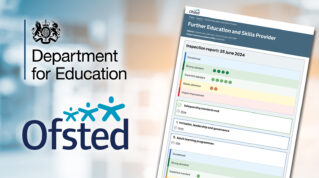Ofsted’s latest changes to its inspection handbook are a further acknowledgement that inspection processes are coming under intense scrutiny following the tragic loss of Ruth Perry.
While Ofsted is taking steps to improve its internal practices and training, it is critical that nominees or provider staff feel confident to raise concerns and professionally challenge inspectors during or after the inspection. The inspectorate is also re-evaluating its complaints procedure, including a new national helpline for leaders to raise concerns. The Fellowship of Inspection Nominees (FIN) advises providers how to make a complaint without fear or trepidation, but hopefully the need for this type of support will diminish.
But how does the inspectorate propose to reduce the stress and fear of inspection itself? Most comment on this absolves Ofsted and instead looks to the DfE to get rid of one-word judgments. I believe this misses an important change of approach the organisation could take today.
FIN promotes the mantra “prepared, not scared”, which helps to support nominees while also emphasising the importance of building resilience among staff. We have worked with providers to achieve this, improve learning provision before inspection and, where needed, we help to pick up the pieces following inspection.
It can be tough witnessing the extreme emotions, anxiety and devastation which a poorly-managed inspection or a negative outcome can have. Ofsted has now publicly recognised the importance of upskilling inspectors and raising awareness in identifying signs of stress and anxiety among education leaders and staff. As MPs have recommended, there should be more dialogue about this as part of the forthcoming ‘Big Listen’.
The consultation should acknowledge that Ofsted has been critical of providers engaging in what is termed as ‘preparing for inspection’. It has discouraged providers reaching out for consultancy support, frowned upon inspection preparation training and has been horrified at the notion of a mock inspection. This stems primarily from concerns about additional workload and stress. However, we can only presume that it also reflects the inspectorate’s worry that such preparations might create an artificial environment, possibly leading to inaccurate assessments of the quality of education they provide.
It’s time for providers to take back control
In reality, as long as there is inspection, there will be inspection preparation. But it’s time for providers to take back control of that process. They should be focusing more on their own needs than Ofsted’s particular likes or dislikes, which can change over time as FIN’s tracking of inspection reports shows.
Inspection preparation programmes should allow providers to give targeted support for the nominee and the shadow nominee, and to train their staff to gain confidence in showcasing their provision. Programmes should also focus on preparing staff to deal with the pressures associated with inspections, fostering resilience. Indeed, it is arguably far more dangerous to mental health to send teams into a high-stakes test without this kind of preparation.
The concept of TCUP (Thinking Clearly Under Pressure) should be at the forefront of this training, concentrating on maintaining composure, presenting evidence and making informed decisions during high-pressure situations. When provider staff fully understand the triangulation of required evidence and measuring impact, it helps to demystify inspection. Equipping staff with these tools will not only impact positively on the provision but will also help to make the inspection experience far less challenging.
Our experience with providers is that practice interviews or a quality review are insightful, motivational and a proven method of resilience building. Collaborative working groups are extremely beneficial with nominees coming together for professional exchange and talking through challenges. Following inspection too, nominees and staff should share their experiences, what they did or did not do well and what they would do differently.
Ofsted’s approach to inspection training is at best naïve, based on the vain hope of seeing providers as they truly are. It should shift to a more mature model that respects preparation as a positive part of the improvement process and a protective measure for staff.
MPs have highlighted a number of other issues which should be considered as part of the ‘Big Listen’. The sector should not waste the opportunity to help shape a more positive environment surrounding quality assurance.
















The very worse thing for a college or provider is not to prepare for inspection at all or for leaders to put fear into their staff about the prospect of the visit of Ofsted. Having an Ofsted Inspector on the staff is extremely useful. I did the equivalent in FEFC days and got 1s both times I was inspected. The ALI provided free nominee training provided by inspectors and it was very well received by nominees in reducing fear by understanding the process. Since leaving Ofsted I have led group nominee training for colleges via the AOC and for whole colleges in the last week of summer term. Ofsted have been trying to diminish the role of nominees since the EIF was introduced. In my view it was to make individuals less aware of when Ofsted got it wrong so they realised they could appeal. So if a nominee contacts Ofsted the day after their inspection will the person dealing with it be impartial and help that provider, or do what they do now in response to a written complaint and protect Ofsted? I think you and I know how it is most likely to work unless there is a complete culture change. Anything that helps providers to know how Ofsted should carry out there work is worthwhile and takes the fear scale down.
Hi Phillip, do you still offer this kind of training/development. I would be interested if it is available.
Thanks
Of course Karen. I can be contacted at Phil@learningimprovementservice.co.uk
I can certainly account for the years of training and support FIN have provided me over the years. My first ever practice interview with Kerry is something I will never forget but has been critical in ensuring I have the confidence as nominee to handle the pressure that an inspection brings.
A calm nominee ensures a much smoother inspection for all involved, and being calm comes from being prepared. I have seen huge changes in Ofsted’s approach over the last few years which is positive to see, but in all stressful situations being prepared and understanding the process and expectations is critical.